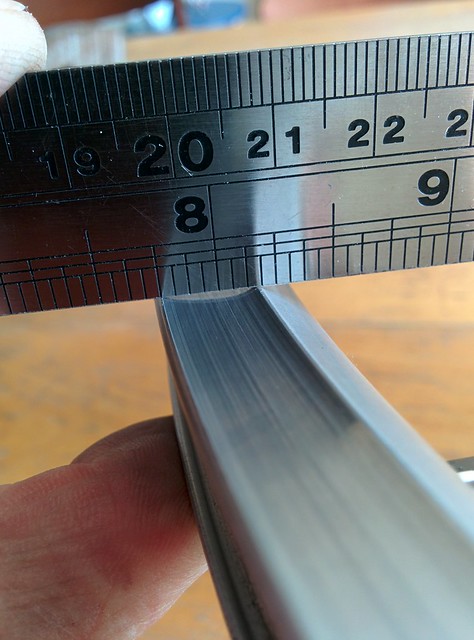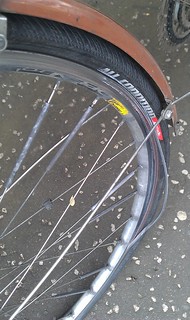I was only going at 10mph, so escaped. I'd just refreshed the pressure before leaving the house.
CityCyclingEdinburgh Forum » Stuff
with a very loud bang
(55 posts)-
Posted 11 years ago #
-
Is that the rim gone? Or just the tyre bead?
Posted 11 years ago # -
Posted 11 years ago #
-
When you have a minute could you post a photo of the cross-section of the rim so we can all see what an imminent failure looks like. Ta.
Posted 11 years ago # -
I'll be able to supply this rim's age to within a few tens of miles too, should anyone else be using Open Pro and Kool Stop pink flavour brake pads.
Posted 11 years ago # -
That would be useful info. Still annoyed at how much metal there was when I replaced my front rim, thinking that it was so concave as to be at risk of failing.
Posted 11 years ago # -
Ouch. This happened to on rims less than a year old. Amazing how much grinding power mucky cycle paths have.
(I've since switched to disc brakes otherwise it was going to get expensive)Posted 11 years ago # -
Open Pro is supposed to be a racing rim. Clearly not quite up to regular commuting in all conditions. Maybe try a slightly chunkier, less fancy rim next time? Touring rims seem to last for ages: Rigida Sputniks or Mavic A319/A119s would be my choice. Maybe a bit heavy for your needs though, and at 19mm internal probably not good for tyres below 28mm.
Posted 11 years ago # -
Stayed perfectly straight for twenty-three months without a single adjustment, though, unlike less-used sparebike's newer dynamoid non-Open Pro front, so I'll bear it in mind in 2016 when the direct replacement ordered yesterday is due to expire.
Posted 11 years ago # -
Thanks for the reminder to replace my dodgy rear wheel....
Posted 11 years ago # -
23 months is pretty good right enough. 5+ days a week, I presume?
The cheap as chips Alex Z1000 rims on my Globe hybrid have been going for 5 years. It's true they didn't see daily use over the past 2 years, but for the first two years icertainly did. Carried some crazy loads too.
It must be said, on the hybrid I'm running lower pressure 35mm tyres. May not be a decisive factor in your case wingpig, but I reckon tyre pressure contributes to fatigue. 25mm running at 115 psi more likely to blow the rim than 35mm running at 85 psi?
Posted 11 years ago # -
23 at 120 then 28 at 100 for two weeks. Sparebike is an Alex something with a 35 at 80.
Posted 11 years ago # -
Aye, maybe the 120psi gradually forced a wee crack to appear as the rim got thinner.
The Alex rimmed wheels are probably due a truing soon, second time in 5 years. Just can't be arsed getting around to it. I'll live with a bit of brake rub in the meantime. I've been worried for at least two years that they are going to go bang sometime soon, but they just keep on rolling.
Of my other bikes, only the audax bike's rear rim has probably had anywhere near the same amount of brake wear as the Globe's rims. Old 1990s Mavic square section rims, seem pretty strong. No wear indicator at all so who knows when they may go? Hopefully not on a fast descent in the rain... Similar story with the Raleigh tourer, old 90s Mavics, slightly less wear.
Ute and tandem are both disc brakes, so not much to worry about. Fold-it bike has drum brakes, so again no rim worries. Wee bucking Bronco folder has V brake at front, coaster at rear. Not really a concern. Singlespeed currently without skewers, and training bike and 'nice bike' Thorn haven't been ridden enough to worry about. Raleigh 20 has chromed steel rims: probably good for another 40 years!
Er.....that's it unless you could Mrs crowriver's bikes and the kids' bikes.
Do I have too many bikes? Probably.
Posted 11 years ago # -
Shouldn't a racing rim be slightly designed to cope with high pressures?
Posted 11 years ago # -
I'm sure it is, but it's also designed to be light, no? Seems to me there'll be compromises involved in producing a light, strong rim for racing. Maybe the compromise is on longevity of wear: thinner sidewalls to reduce weight, treated to make them harder no doubt but probably still wear through faster than a thicker, heavier rim?
Anyway, I suppose it all comes down to intended use and riding philosophy in the end. I'm generally going for robustness, longevity, lower cost in a rim. Most of my riding is on tyres wider than 28mm (despite two bikes on 23mm tyres, one on 25mm). So I can go for chunkier touring or hybrid rims. Folk looking for performance, speed, and light weight will go for a narrower, lighter rim that will generally cost more but may not last as long.
Posted 11 years ago # -
I have the black anodised Open Pro rims for 6 years now and they look good for another 6 years. The anodising definitely creates a harder outer layer. 100+ psi, 23mm tyres.
Can't believe it was the front that went first for @winpig.The non-anodised MA2 rims used only last me 2 years on the back wheel. At least I have a plentiful supply of spare spokes/hubs after stubbornly giving them 3 chances to prove their worth.
Posted 11 years ago # -
The spare front wheel in place just now is twenty-three-ish years old, though has only had two years' use in the last eight.
Posted 11 years ago # -
Of course, I had no track pump for the first thirteen years when it was in constant use which is probably the only reason it never catastrophically exploded on me.
Posted 11 years ago # -
I had a rear rim bulge in a less dramatic but vaguely similar manner on the Brompton, heard a bang over a pothole, (but that's normal in Edinburgh on a small wheel bike!) and on braking felt a huge pulse through the back brake lever, on inspection part of the rear rim braking surface had split away from the rim and was bulging out by several mm. Got away with backing off the brake and riding it home (cautiously!) but that was only 80 odd psi. (though who knows what it would spike at while being compressed by an Edinburgh crater :-/ )
Posted 11 years ago # -
@le_soigneur, IIRC it's MA2s I have on the audax bike rear, and also the 'summer' front wheel (sans dynamo hub). Sounds like you got good life out the Open Pros. Maybe wingpig was just unlucky?
Posted 11 years ago # -
I've holed a Mavic rim at ~80 psi - nothing dramatic, just a series of arcs of holes along the braking surface.
This was a fairly heavy duty, double walled affair, so seemed to be able to hold pressure, although braking was iffy, which led to the inspection and discovery of a new rim wear indicator - no metal=time to change!
Robert
Posted 11 years ago # -
@Roibeard
Mavic rims are astonishing. I rode the first set I had until the walls started to splay. Cut a transverse section to see what was going on and there was hardly any metal left, but they were still round and rideable. It's one of the few brands to which I have any loyalty.
Posted 11 years ago # -
I think highly of Mavic rims too. Open Pro on the commuter and A319 on tourer and the sloth bike with a 3 speed hub.
319s are heavy but very, very strong.
Open Pros are fairly pricey but are very good at staying straight. They are built to a certain weight though and I do wear through them quicker than the A319, but then again I cycle on them 5 days a week rather than 5 days a month so they probably wear just as well, I just use them more...
Posted 11 years ago # -
@crowriver You could be right about winpig being unlucky, especially seeing as it is the front rim, if the brake pads picked up a flint and scored the sidewall then that might have produced a stress fault line.
BTW Jobst Brandt has the opposite opinion on my anodized/non-anodized anecdotal experience.
Posted 11 years ago # -
I've had 2 open pros go that way - once when inflating the tyre in my stairwell and once when riding, fortunately only 100m from home. The bang is indeed loud; on the first occasion several neighbours came out to find out what was going on!
The Open Pro CD rims (hard anodized grey-coloured rims) do indeed wear much better than the plain aluminium surface; hardly any concavity on the one I have on at the moment and that's been on for over 2 years now. Over that time have used a mix of Ashima and Kool-Stop dual compound pads.
Supposedly the Open Pro rims all have a wear indicator that can be used to determine when they need replacing; I've never figured out how it is actually supposed to work. Even the Mavic online Tech Manual doesn't seem to know.
Posted 11 years ago # -
@david.nutter
The rim wear indicator is just a small indentation ground into the inner surface of the outer wall of the rim. When the rim reaches the service limit, you see a small hole from the outside. Its position is indicated on the rim sticker.
Posted 11 years ago # -
As a mechanic said to me few weeks ago when showing me a customer's old wheel, "he should go out and buy a lottery ticket" because I think you've been lucky riding Open Pros to destruction. I've used them for twelve years and retire them when the braking surface is about 1mm concave. I wasn't aware of them having wear indicators.
 Worn (out) Mavic Open Pro by Cycling Mollie, on Flickr
Posted 11 years ago #
Worn (out) Mavic Open Pro by Cycling Mollie, on Flickr
Posted 11 years ago # -
That's pretty impressive!
Think I would have replaced mine before it went that far!!
I've always liked Mavics too.
Posted 11 years ago # -
@IWRATS, Aha, clearly I am not eagle-eyed enough to spot the hole. I gave the failed rims a good look but didn't see anything that looked like that. I guess the area of rim that exploded outwards might have obliterated the hole but I can't remember where the failure point was in relation to the rim sticker.
Will have a look at the surviving rear rim (regular Open Pro) and compare it with the CD variety tonight.
Posted 11 years ago # -
@david.nutter
Turns out there are both internal and external wear indicators on Mavic rims, depending on model;
http://www.tech-mavic.com/tech-mavic/technical_manual/data/docs/products/2_104.pdf
Service limit is 0.4mm of wear. I use A319s, with an internal indicator.
Posted 11 years ago #
Reply »
You must log in to post.



 posts
posts
